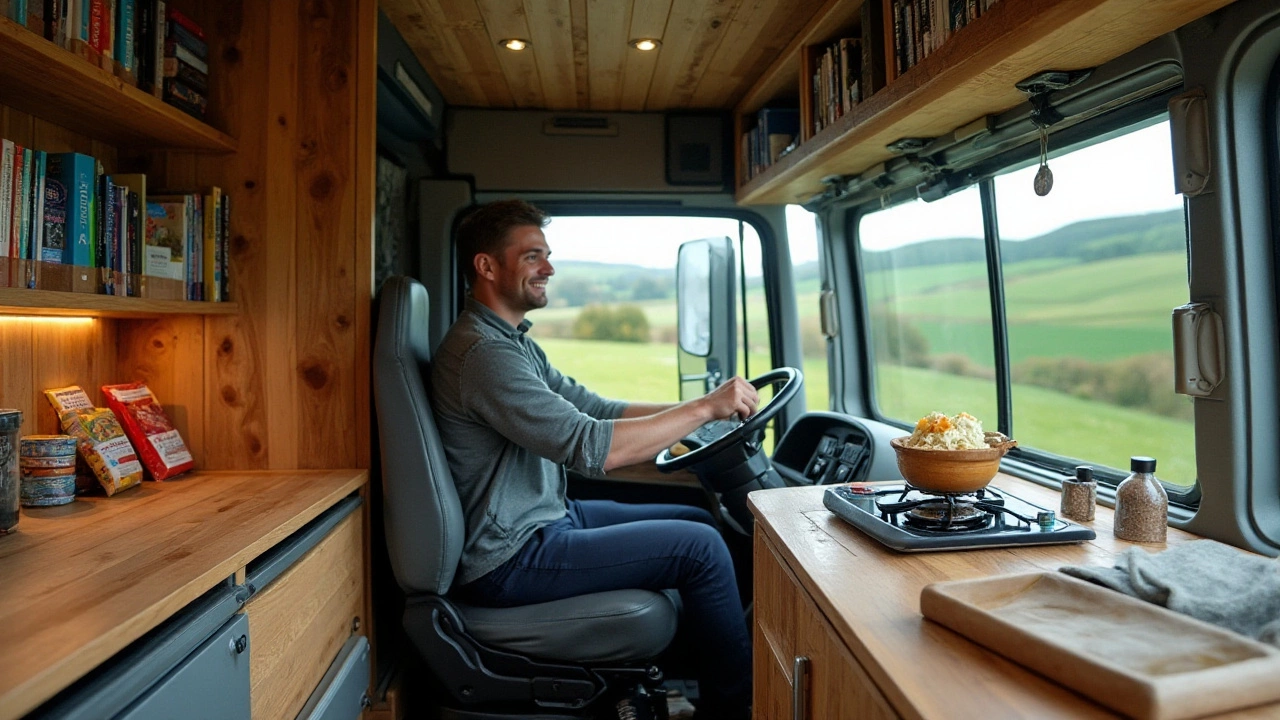Being a truck driver isn't just a job; it's a lifestyle choice. For those who spend countless hours traversing highways, the truck cab becomes a familiar companion—one that needs to offer more than just a seat behind the wheel. Ever wonder if it's possible to actually live in a truck? Well, many drivers certainly do, making these vehicles their homes on the road.
For those new to truck driving, adapting to life in a truck can be quite the adjustment. But with some creativity and planning, the limited space can become a cozy sanctuary. Whether it's setting up a sleeping area, organizing storage, or cooking meals, making the cab comfortable can greatly improve the quality of life for those long stretches away from home.
- The Reality of Truck Cab Living
- Comforts and Challenges
- Maximizing Space and Storage
- Maintaining Health on the Road
- Legal and Safety Considerations
The Reality of Truck Cab Living
The idea of living in a truck cab might sound unusual to many, but for numerous truck drivers, it's a daily reality. The truck cab becomes an intimate space—a place where long journeys start and end. Living this way involves a significant shift in mindset compared to traditional living. Many drivers find themselves developing a deep connection with the road, where the hum of the engine lulls them to sleep at night. They have to manage with the space between the driver's seat and the sleeper compartment, which serves as both a bedroom and storage area. How does one navigate life in such limited quarters?
The truck living experience varies depending on the amenities available in the cab. Modern trucks often come equipped with comfortable beds, small refrigerators, and even microwaves, transforming the cab into a mini-studio apartment. Packing strategically becomes an art form; necessities such as clothing, food, and personal items must fit efficiently within the confines of the storage compartments. Trips to roadside convenience stores or truck stops help to replenish supplies, making it essential for drivers to plan stops wisely. But it's not just about logistics; there's a profound sense of freedom in having the open road as one's backyard.
Of course, truck cab living comes with its set of challenges. Privacy is a luxury, and the absence of loved ones can stir feelings of isolation. "It's a solitary life, but there's a certain peace in it," a seasoned driver once shared in an interview with a transportation magazine. Making time to communicate with friends and family through calls or video chats becomes a lifeline. Truckers also lean on each other for camaraderie, sharing tips and stories at rest stops, which creates a sense of community despite the distance. Yet, the solace of solitude also allows for self-reflection and personal growth.
Life on the road demands resilience and adaptability. Drivers must adjust their sleep schedules around delivery timelines while ensuring they remain alert and focused on the road. Nutrition can be another hurdle, as eating healthy isn't always easy when fast food options dominate on-the-road dining. Drivers often turn to portable cooking appliances to prepare meals that sustain them for long hauls. Truck cab living requires more than physical endurance; it calls for an emotional and mental fortitude that not everyone possesses. Adapting to this lifestyle is about finding joy in the simple things—like a beautiful sunrise on an early morning drive or the quiet after a long day of traveling.
Another layer of complexity is navigating the legal aspects. Regulations dictate the maximum number of hours a driver can be on the road, prompting the need for scheduled breaks and rest periods. Truckers must keep logbooks to ensure compliance, which can add to the load of responsibilities. State and federal laws vary, creating a patchwork of rules that drivers must learn to navigate. Despite these complications, drivers often report a profound satisfaction in their work, appreciating the sense of contribution they provide in keeping goods moving across the country.
Comforts and Challenges
Life in the truck cab comes with a unique blend of comforts and challenges. For starters, the vast openness of the road offers a distinct sense of freedom that many drivers find alluring. There's an inexplicable charm in waking up to a new horizon every morning, watching landscapes unfurl through the windshield. This constant movement can be thrilling for those who loathe monotony and crave variety. Drivers often mention the flexibility of setting their schedule as a major perk, allowing them to manage time to fit personal tempos and preferred routes.
On the flip side, this constant motion can morph into a challenge. Spending extended periods away from home can test resilience, making it difficult to strike a work-life balance. Drivers miss family events, and finding ways to stay connected digitally becomes crucial. The potential for loneliness is a stark reality, and keeping a positive mental space requires effort and attention. Establishing rituals, like calls home or listening to familiar music, helps in combating solitude on those long nocturnal journeys.
“You need to be mentally prepared for it,” says Mike Howard, a veteran driver of two decades. “No one tells you how quiet it gets sometimes, but it's important to have strategies to keep your spirits up.”
Comfort inside the truck cab varies depending on how well one personalizes it. Modern trucks come equipped with reclining seats, sleeping provisions, entertainment systems, and even basic cooking facilities. Drivers can maximize comfort by investing in quality bedding and organizing their space for efficiency. Smart spatial arrangements ensure everything has its designated spot, transforming a potentially cramped area into a cozy nook. Certain trucks also offer additional amenities, such as fridges and power outlets, which add convenience to life on the go.
Managing Creature Comforts
To better adapt, some drivers recommend creating a miniature setup of home-like amenities. Keeping a stash of favorite snacks, or carrying small tokens from home can provide comfort amidst the unfamiliar. Well-being is paramount, and maintaining a healthy lifestyle while on the road is one significant hurdle. Exercise is often a challenge due to the confined space and limited downtime. Yet, many incorporate creative exercise routines during stops or carry portable equipment to squeeze in workouts when possible, maintaining both physical and mental vitality.
Challenges like handling bad weather, road closures, or unexpected breakdowns also add to the unpredictable nature of the job, requiring quick-thinking and problem-solving skills. Preparing for such uncertainties with a well-stocked first aid and emergency kit, and keeping vital communication lines open, ensures readiness for unexpected situations. The physical demands, coupled with navigating intricate logistics, make for a high-pressure job environment that requires a keen sense of responsibility.
In entertaining the idea of such a lifestyle, understanding the dual edge of life on wheels sketches a realistic picture. While there are significant hurdles to overcome, the blend of adventure and autonomy is undeniable. For those drawn to the call of the open road, these challenges become stepping stones, crafting a profound, if unconventional, way of living.

Maximizing Space and Storage
Living on the road means every inch of your truck cab counts. When space is tight, clever storage solutions make all the difference. For many truck drivers, it all starts with using the vertical space wisely. You’d be amazed how much can be stored above your head if you think creatively. Shelving units, specially designed for truck cabs, fit snugly along the walls, allowing storage for essentials without encroaching on your living area. Velcro and magnetic strips can also come in handy for lightweight items, keeping them secure while you drive.
Clever use of containers is another secret weapon for a more organized truck cabin. Stackable containers help keep everything in order while still being easily accessible. Think about labeling these containers, which not only makes it easier to find what you need when you need it but also helps maintain organization over time. An unexpected benefit is the peace of mind it brings—knowing exactly where your belongings are during swift stops and starts.
Prioritizing Essentials
When it comes to life on the road, it’s helpful to streamline and prioritize what you truly need. Decluttering becomes a necessity to maintain sanity and space. Consider which items you regularly use and which are just taking up valuable room. Rolling clothing instead of folding it can save space and also prevent wrinkles—a handy trick for long-haul rides where washing and ironing facilities are few and far between.
"A place for everything and everything in its place isn't just a mantra. In the confined quarters of a truck, it becomes survival," an experienced trucker once shared on a popular driving forum.Identifying must-have items and donating or storing the rest can transform cramped quarters into a well-organized home on wheels.
Innovative Gadgets and Tools
These days, technology offers a wide array of gadgets tailored for truck living. From portable cooking units to collapsible furniture, the market is ripe with products that serve dual purposes. A small space heater, for example, not only keeps you warm but can double as a drying unit for wet gear. When cooking, gadgets like a 12-volt slow cooker or a compact microwave designed for vehicles can save space while providing the means to prepare home-cooked meals miles away from home.
To measure the impact of these savvy strategies, consider this: According to a recent survey of long-distance drivers, about 70% found increased daily comfort when they adapted store-bought solutions to their truck setups. Here’s a small table illustrating some popular space-saving tools:
| Gadget | Purpose |
|---|---|
| Collapsible Kettle | Boil water without bulky equipment |
| Mini Fridge | Keep perishables fresh in a small footprint |
| Car Vacuum | Compact tool for quick cleanups |
The key is not just in having these gadgets but also ensuring they are properly stored when not in use. Every tool should have its own place, reinforcing the notion that organization is king in confined spaces. For HGV drivers, making the cab a comfortable sanctuary starts and ends with how well you manage your space.
Maintaining Health on the Road
Living in a truck is an adventure, but it poses unique challenges to maintaining a healthy lifestyle. Drivers often face long hours of sitting, limited access to fresh food, and irregular sleep patterns. All these can take a toll on one's physical and mental health if not managed properly. A crucial first step is embracing regular exercise, which can be challenging given the lack of space. Yet, truck stops and rest areas can be turned into your personal gym with a little creativity. Simple exercises like stretching, squats, and push-ups don't require much room and can significantly boost energy levels and mood.
Eating healthy on the road doesn’t have to be expensive or difficult. Sure, the lure of fast food is strong when you're pressed for time. Yet, with a little planning, more nutritious options can be at your fingertips. Keep a stock of healthy snacks like nuts, fruits, and yogurt in your truck. Investing in a small portable fridge can make all the difference in maintaining a diet that supports your health goals. If you’re up for a bit of culinary adventure, bringing along a small cooker or a slow-cooker can enable you to whip up simple, wholesome meals right in your cab.
Quality sleep is another pillar of good health, and it's crucial for safe driving. Creating a comfortable, quiet sleep environment in your cab is vital. Consider investing in a high-quality mattress and blackout curtains to ensure you get restful sleep regardless of where you park. Establishing a sleep routine is beneficial too; keep a fixed time for hitting the hay as it helps regulate your body clock, making it easier to fall asleep and wake up refreshed.
Truck drivers often experience isolation, which can impact mental well-being. Social connections and entertainment on the go help keep spirits high. Technology comes in handy here—whether it's through video calls with family, listening to audiobooks, or joining online communities of fellow truckers. They can be crucial for support and sharing tips for life on the road. To quote the late writer Bernard Shaw,
"Life isn't about finding yourself. Life is about creating yourself." This rings true for truck drivers who must adapt and thrive even when miles away from home.
Last but not least, regular health check-ups are essential. Many drivers overlook this due to the constant grind, but nothing replaces professional medical advice. It's wise to schedule regular check-ups whenever feasible and remain vigilant about any signs of health problems. With smart habits and a proactive mindset, maintaining health on the road becomes an achievable goal, ensuring that both you and your truck keep rolling smoothly.

Legal and Safety Considerations
Living in a truck presents its own unique set of legal and safety concerns. One crucial aspect for drivers is the adherence to the regulations set by governing bodies such as the Federal Motor Carrier Safety Administration (FMCSA). These rules are crucial for maintaining safety standards on the road, and they help ensure that truck drivers, who often live in their vehicles for extended periods, do not push themselves beyond their physical limits. The rules specify strict guidelines on driving hours and mandatory rest periods to prevent fatigue, which is a leading cause of road accidents.
Understanding where you can legally park your truck overnight is another significant consideration. Not every rest area or parking lot is permissive for truck overnight stays, and drivers need to be aware of these restrictions to avoid fines or penalties. Urban areas have different laws compared to rural stretches of road. In some states, truck stops and rest areas offer designated sleeping bays, while in others, local ordinances might restrict overnight parking altogether. Safety is also an issue, as isolated areas might pose risk of theft or vandalism.
Health and hygiene are also major concerns for those living in their trucks. Most trucks are not equipped with bathroom facilities, requiring the driver to strategically plan their pit stops. Access to public restrooms is essential, and hygiene upkeep should never be neglected. Maintaining a clean and organized living space is crucial, not just for comfort but because it translates to a clear mind, ready to tackle the challenges of the road. “Cleanliness is next to truckiness,” one might jokingly assert, but the truth of it cannot be underestimated.
Ensuring that the truck is outfitted with basic safety equipment is also paramount. This includes the installation of smoke detectors, availability of a fire extinguisher, and an emergency kit with first-aid supplies. Personal safety gadgets like pepper spray or a whistle might be carried by those who wish to take extra precautions, especially when parked in less secure locations. In the rare case of emergency situations, knowing how to react swiftly can make all the difference.
On top of these considerations, truck drivers should also be mindful of personal safety concerning other road users. Defensive driving techniques are crucial when operating large vehicles like trucks, especially when maneuvering through congested traffic or challenging weather conditions. Regular vehicle maintenance checks are not just good practice but necessary. These checks should include brake inspections, tire evaluations, and engine performance assessments. Most experienced drivers schedule these checks ahead of long hauls to prevent unwanted breakdowns.
Lastly, it's important to remember the community support available to truck drivers. Numerous online platforms exist where drivers can seek advice, share experiences, and alert each other about road conditions or safe parking zones. Quoting a member from the Truckers Report forum, “Never hesitate to ask, there’s always a way through.” This shared knowledge base can be both comforting and enlightening, helping to foster a sense of camaraderie among those who spend much of their time on the road.

